- Home
- J. G. Ballard
The Complete Short Stories, Volume 2 Page 17
The Complete Short Stories, Volume 2 Read online
Page 17
‘Gaston, this is Mr Halliday. He’s staying at one of the hotels at Columbine Sept Heures. Perhaps you could give him a lift to the river crossing.’
Halliday was about to accept, but the chauffeur made no response to the suggestion. Halliday felt himself shiver in the cooler air moving toward the river out of the dusk. He bowed to Gabrielle Szabo and walked off past the chauffeur. As he stopped, about to remind her of the trip to Leptis Magna, he heard her say, ‘Gaston, there was a doctor here.’
The meaning of this oblique remark remained hidden from Halliday as he watched the house from the roof of the Oasis Hotel. Gabrielle Szabo sat on the terrace in the dusk, while the chauffeur made his foraging journeys to Columbine and the refineries along the river. Once Halliday came across him as he rounded a corner near the Fine Arts School, but the man merely nodded and trudged on with his jerrican of water. Halliday postponed a further visit to the house. Whatever her motives for being there, and whoever she was, Gabrielle Szabo had brought him the dreams that Columbine Sept Heures and his long journey south had failed to provide. Besides, the presence of the woman, turning some key in his mind, was all he required. Rewinding his clocks, he found that he slept for eight or nine hours of the nights he set himself.
However, a week later he found himself again failing to sleep. Deciding to visit his neighbour, he went out across the river, walking into the dusk that lay ever deeper across the sand. As he reached the house the white Mercedes was setting off along the road to the coast. In the back Gabrielle Szabo sat close to the open window, the dark wind drawing her black hair into the slipstream.
Halliday waited as the car came towards him, slowing as the driver recognized him. Gaston’s head leaned back, his tight mouth framing Halliday’s name. Expecting the car to stop, Halliday stepped out into the road.
‘Gabrielle … Miss Szabo –’
She leaned forward, and the white car accelerated and swerved around him, the cerise dust cutting his eyes as he watched the woman’s masked face borne away from him.
Halliday returned to the hotel and climbed to the roof, but the car had disappeared into the darkness of the north-east, its wake fading into the dusk. He went down to his suite and paced around the paintings. The last of the clocks had almost run down. Carefully he wound each one, glad for the moment to be free of Gabrielle Szabo and the dark dream she had drawn across the desert.
When the clocks were going again he went down to the basement. For ten minutes he moved from car to car, stepping in and out of the Cadillacs and Citroëns. None of the cars would start, but in the service bay he found a Honda motorcycle, and after filling the tank managed to kick the engine into life. As he set off from Columbine the sounds of the exhaust reverberated off the walls around him, but a mile from the town, when he stopped to adjust the carburettor, the town seemed to have been abandoned for years, his own presence obliterated as quickly as his shadow.
He drove westward, the dawn rising to meet him. Its colours lightened, the ambiguous contours of the dusk giving way to the clear outlines of the dunes along the horizon, the isolated watertowers standing like welcoming beacons.
Losing his way when the road disappeared into the sand sea, Halliday drove the motorcycle across the open desert. A mile to the west he came to the edge of an old wadi. He tried to drive the cycle down the bank, then lost his balance and sprawled onto his back as the machine leapt away and somersaulted among the rocks. Halliday trudged across the floor of the wadi to the opposite bank. Ahead of him, its silver gantries and tank farms shining in the dawn light, was an abandoned refinery and the white roofs of the near-by staff settlement.
As he walked between the lines of chalets, past the empty swimming pools that seemed to cover all Africa, he saw the Peugeot parked below one of the ports. Sitting with her easel was Leonora Sully, a tall man in a white suit beside her. At first Halliday failed to recognize him, although the man rose and waved to him. The outline of his head and high forehead was familiar, but the eyes seemed unrelated to the rest of his face. Then Halliday recognized Dr Mallory and realized that, for the first time, he was seeing him without his sunglasses.
‘Halliday … my dear chap.’ Mallory stepped around the drained pool to greet him, adjusting the silk scarf in the neck of his shirt. ‘We thought you’d come one day …’ He turned to Leonora, who was smiling at Halliday. ‘To tell you the truth we were beginning to get a little worried about him, weren’t we, Leonora?’
‘Halliday …’ Leonora took his arm and steered him round to face the sun. ‘What’s happened – you’re so pale!’
‘He’s been sleeping, Leonora. Can’t you see that, my dear?’ Mallory smiled down at Halliday. ‘Columbine Sept Heures is beyond the dusk line now. Halliday, you have the face of a dreamer.’
Halliday nodded. ‘It’s good to leave the dusk, Leonora. The dreams weren’t worth searching for.’ When she looked away Halliday turned to Mallory. The doctor’s eyes disturbed him. The white skin in the orbits seemed to isolate them, as if the level gaze was coming from a concealed face. Something warned him that the absence of the sunglasses marked a change in Mallory whose significance he had not yet grasped.
Avoiding the eyes, Halliday pointed to the empty easel. ‘You’re not painting, Leonora.’
‘I don’t need to, Halliday. You see …’ She turned to take Mallory’s hand. ‘We have our own dreams now. They come to us across the desert like jewelled birds …’
Halliday watched them as they stood together. Then Mallory stepped forward, his white eyes like spectres. ‘Halliday, of course it’s good to see you … you’d probably like to stay here –’
Halliday shook his head. ‘I came for my car,’ he said in a controlled voice. He pointed to the Peugeot. ‘Can I take it?’
‘My dear chap, naturally. But where are –’ Mallory pointed warningly to the western horizon, where the sun burned in an immense pall. ‘The west is on fire, you can’t go there.’
Halliday began to walk toward the car. ‘I’m going to the coast.’ Over his shoulder, he added, ‘Gabrielle Szabo is there.’
This time, as he fled towards the night, Halliday was thinking of the white house across the river, sinking into the last light of the desert. He followed the road that ran north-east from the refinery, and found a disused pontoon bridge that crossed the wadi. The distant spires of Columbine Sept Heures were touched by the last light of sunset.
The streets of the town were deserted, his own footsteps in the sand already drowned by the wind. He went up to his suite in the hotel. Gabrielle Szabo’s house stood isolated on the far shore. Holding one of the clocks, its hands turning slowly within the ormolu case, Halliday saw the chauffeur bring the Mercedes into the drive. A moment later Gabrielle Szabo appeared, a black wraith in the dusk, and the car set off toward the north-east.
Halliday walked around the paintings in the suite, gazing at their landscapes in the dim light. He gathered his clocks together and carried them onto the balcony, then hurled them down one by one onto the terrace below. Their shattered faces, the white dials like Mallory’s eyes, looked up at him with unmoving hands.
Half a mile from Leptis Magna he could hear the sea washing on the beaches through the darkness, the onshore winds whipping at the crests of the dunes in the moonlight. The ruined columns of the Roman city rose beside the single tourist hotel that shut out the last rays of the sun. Halliday stopped the car by the hotel, and walked past the derelict kiosks at the outskirts of the town. The tall arcades of the forum loomed ahead, the rebuilt statues of Olympian deities standing on their pedestals above him.
Halliday climbed onto one of the arches, then scanned the dark avenues for any sign of the Mercedes. Uneager to venture into the centre of the town, he went back to his car, then entered the hotel and climbed to the roof.
By the sea, where the antique theatre had been dug from the dunes, he could see the white rectangle of the Mercedes parked on the bluff. Below the proscenium, on the flat semi-circle of the st
age, the dark figure of Gabrielle Szabo moved to and fro among the shadows of the statues.
Watching her, and thinking of Delvaux’s ‘Echo’, with its triplicated nymph walking naked among the classical pavilions of a midnight city, Halliday wondered whether he had fallen asleep on the warm concrete roof. Between his dreams and the ancient city below there seemed no boundary, and the moonlit phantoms of his mind moved freely between the inner and outer landscapes, as in turn the dark-eyed woman from the house by the drained river had crossed the frontiers of his psyche, bringing with her a final relief from time.
Leaving the hotel, Halliday followed the street through the empty town, and reached the rim of the amphitheatre. As he watched, Gabrielle Szabo came walking through the antique streets, the fleeting light between the columns illuminating her white face. Halliday moved down the stone steps to the stage, aware of the chauffeur watching him from the cliff beside the car. The woman moved towards Halliday, her hips swaying slowly from side to side.
Ten feet from him she stopped, her raised hands testing the darkness. Halliday stepped forward, doubting if she could see him at all behind the sunglasses she still wore. At the sound of his footsteps she flinched back, looking up towards the chauffeur, but Halliday took her hand.
‘Miss Szabo. I saw you walking here.’
The woman held his hands in suddenly strong fingers. Behind the glasses her face was a white mask. ‘Mr Halliday –’ She felt his wrists, as if relieved to see him. ‘I thought you would come. Tell me, how long have you been here?’
‘Weeks – or months, I can’t remember. I dreamed of this city before I came to Africa. Miss Szabo, I used to see you walking here among these ruins.’
She nodded, taking his arm. Together they moved off among the columns. Between the shadowy pillars of the balustrade was the sea, the white caps of the waves rolling towards the beach.
‘Gabrielle … why are you here? Why did you come to Africa?’
She gathered the silk robe in one hand as they moved down a stairway to the terrace below. She leaned closely against Halliday, her fingers clasping his arm, walking so stiffly that Halliday wondered if she were drunk. ‘Why? Perhaps to see the same dreams, it’s possible.’
Halliday was about to speak when he noticed the footsteps of the chauffeur following them down the stairway. Looking around, and for one moment distracted from Gabrielle’s swaying body against his own, he became aware of a pungent smell coming from the vent of one of the old Roman cloacas below them. The top of the brick-lined sewer had fallen in, and the basin was partly covered by the waves swilling in across the beach.
Halliday stopped. He tried to point below but the woman was holding his wrist in a steel grip. ‘Down there! Can you see?’
Pulling his hand away, he pointed to the basin of the sewer, where a dozen half-submerged forms lay heaped together. Bludgeoned by the sea and wet sand, the corpses were only recognizable by the back-and-forth movements of their arms and legs in the shifting water.
‘For God’s sake – Gabrielle, who are they?’
‘Poor devils …’ Gabrielle Szabo turned away, as Halliday stared over the edge at the basin ten feet below. ‘The evacuation – there were riots. They’ve been here for months.’
Halliday knelt down, wondering how long it would take the corpses – whether Arab or European he had no means of telling – to be swept out to sea. His dreams of Leptis Magna had not included these melancholy denizens of the sewers. Suddenly he shouted again.
‘Months? Not that one!’
He pointed again to the body of a man in a white suit lying to one side farther up the sewer. His long legs were covered by the foam and water, but his chest and arms were exposed. Across the face was the silk scarf he had seen Mallory wearing at their last meeting.
‘Mallory!’ Halliday stood up, as the black-suited figure of the chauffeur stepped onto a ledge twenty feet above. Halliday went over to Gabrielle Szabo, who was standing by the step, apparently gazing out to sea. ‘That’s Dr Mallory! He lived with me at Columbine Sept Heures! How did he – Gabrielle, you knew he was here!’
Halliday seized her hands, in his anger jerked her forward, knocking off her glasses. As she fell to her knees, scrambling helplessly for them, Halliday held her shoulders. ‘Gabrielle! Gabrielle, you’re –’
‘Halliday!’ Her head lowered, she held his fingers and pressed them into her orbits. ‘Mallory, he did it – we knew he’d follow you here. He was my doctor once, I’ve waited for years …’
Halliday pushed her away, his feet crushing the sunglasses on the floor. He looked down at the white-suited figure washed by the waves, wondering what nightmare was hidden behind the scarf over its face, and sprinted along the terrace past the auditorium, then raced away through the dark streets.
As he reached the Peugeot the black-suited chauffeur was only twenty yards behind. Halliday started the motor and swung the car away through the dust. In the rear mirror he saw the chauffeur stop and draw a pistol from his belt. As he fired the bullet shattered the windshield. Halliday swerved into one of the kiosks, then regained control and set off with his head down, the cold night air blowing fragments of frosted glass into his face.
Two miles from Leptis, when there was no sight of the Mercedes in pursuit, he stopped and knocked out the windshield. As he drove on westward the air grew warmer, the rising dawn lifting in front of him with its promise of light and time.
1966
THE IMPOSSIBLE MAN
At low tide, their eggs buried at last in the broken sand below the dunes, the turtles began their return journey to the sea. To Conrad Foster, watching beside his uncle from the balustrade along the beach road, there seemed little more than fifty yards to the safety of the slack water. The turtles laboured on, their dark humps hidden among the orange crates and the drifts of kelp washed up from the sea. Conrad pointed to the flock of gulls resting on the submerged sandbank in the mouth of the estuary. The birds had been staring out to sea, as if uninterested in the deserted shoreline where the old man and the boy waited by the rail, but at this small movement of Conrad’s a dozen white heads turned together.
‘They’ve seen them …’ Conrad let his arm fall to the rail. ‘Uncle Theodore, do you think –?’
His uncle gestured with the stick at a car moving along the road a quarter of a mile away. ‘It could have been the car.’ He took his pipe from his mouth as a cry came from the sandbank. The first flight of gulls rose into the air and began to turn like a scythe towards the shore. ‘Here they come.’
The turtles had emerged from the shelter of the debris by the tideline. They advanced across the sheet of damp sand that sloped down to the sea, the screams of the gulls tearing at the air over their heads.
Involuntarily Conrad moved away towards the row of chalets and the deserted tea garden on the outskirts of the town. His uncle held his arm. The turtles were being picked from the shallow water and dropped on the sand, then dismembered by a dozen beaks.
Within barely a minute of their arrival the birds began to rise from the beach. Conrad and his uncle had not been the only spectators of the gulls’ brief feast. A small party of some dozen men stepped down from their vantage point among the dunes and moved along the sand, driving the last of the birds away from the turtles. The men were all elderly, well into their sixties and seventies, and wore singlets and cotton trousers rolled to their knees. Each carried a canvas bag and a wooden gaff tipped by a steel blade. As they picked up the shells they cleaned them with swift, practised movements and dropped them into their bags. The wet sand was streaked with blood, and soon the old men’s bare feet and arms were covered with the bright stains.
‘I dare say you’re ready to move.’ Uncle Theodore looked up at the sky, following the gulls back to the estuary. ‘Your aunt will have something waiting for us.’
Conrad was watching the old men. As they passed, one of them raised his ruby-tipped gaff in greeting. ‘Who are they?’ he asked as his uncle acknowledged the
salute.
‘Shell collectors – they come here in the season. These shells fetch a good price.’
They set off towards the town, Uncle Theodore moving at a slow pace with his stick. As he waited Conrad glanced back along the beach. For some reason the sight of the old men streaked with the blood of the slaughtered turtles was more disturbing than the viciousness of the seagulls. Then he remembered that he himself had probably set off the birds.
The sounds of a truck overlaid the fading cries of the gulls as they settled themselves on the sandbank. The old men had gone, and the incoming tide was beginning to wash the stained sand. They reached the crossing by the first of the chalets. Conrad steered his uncle to the traffic island in the centre of the road. As they waited for the truck to pass he said, ‘Uncle, did you notice the birds never touched the sand?’
The truck roared past them, its high pantechnicon blocking off the sky. Conrad took his uncle’s arm and moved forward. The old man plodded on, rooting his stick in the sandy tarmac. Then he flinched back, the pipe falling from his mouth as he shouted at the sports car swerving towards them out of the dust behind the truck. Conrad caught a glimpse of the driver’s white knuckles on the rim of the steering wheel, a frozen face behind the windshield as the car, running down its own brakes, began to slide sideways across the road. Conrad started to push the old man back but the car was on them, bursting across the traffic island in a roar of dust.
The hospital was almost empty. During the first days Conrad was glad to lie motionlessly in the deserted ward, watching the patterns of light reflected on to the ceiling from the flowers on the window-sill, listening to the few sounds from the orderly room beyond the swing doors. At intervals the nurse would come and look at him. Once, when she bent down to straighten the cradle over his legs, he noticed that she was not a young woman but even older than his aunt, despite her slim figure and the purple rinse in her hair. In fact, all the nurses and orderlies who tended him in the empty ward were elderly, and obviously regarded Conrad more as a child than a youth of seventeen, treating him to a mindless and amiable banter as they moved about the ward.

 High-Rise
High-Rise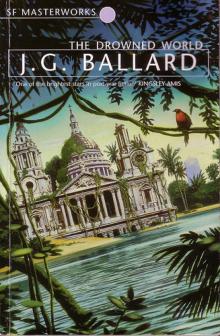 The Drowned World
The Drowned World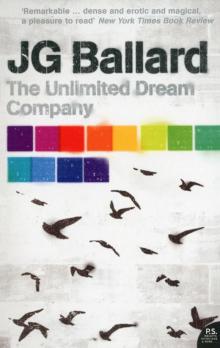 The Unlimited Dream Company
The Unlimited Dream Company Running Wild
Running Wild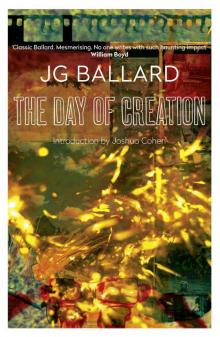 The Day of Creation
The Day of Creation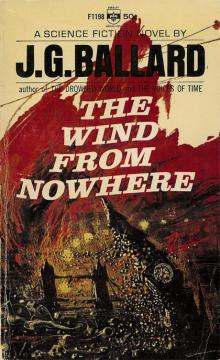 The Wind From Nowhere
The Wind From Nowhere The Complete Short Stories, Volume 2
The Complete Short Stories, Volume 2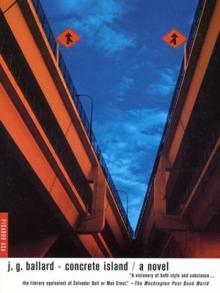 Concrete Island
Concrete Island Empire of the Sun
Empire of the Sun The Kindness of Women
The Kindness of Women Vermilion Sands
Vermilion Sands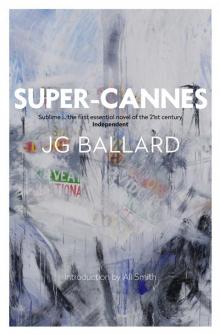 Super-Cannes
Super-Cannes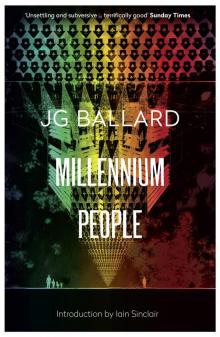 Millennium People
Millennium People The Complete Stories of J. G. Ballard
The Complete Stories of J. G. Ballard Crash
Crash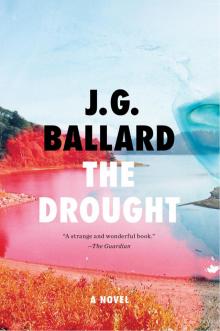 The Drought
The Drought The Atrocity Exhibition
The Atrocity Exhibition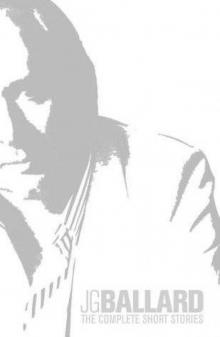 The Complete Short Stories: Volume 1
The Complete Short Stories: Volume 1 Miracles of Life: Shanghai to Shepperton: An Autobiography
Miracles of Life: Shanghai to Shepperton: An Autobiography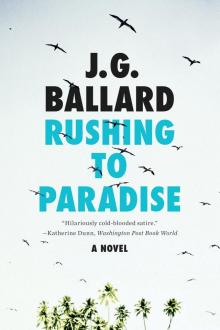 Rushing to Paradise
Rushing to Paradise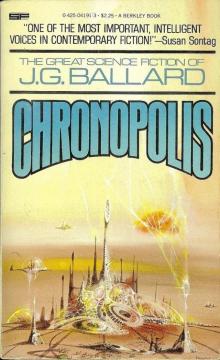 Chronopolis
Chronopolis Cocaine Nights
Cocaine Nights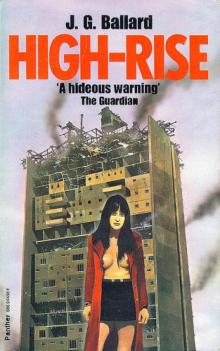 High Rise (1987)
High Rise (1987) The Complete Short Stories
The Complete Short Stories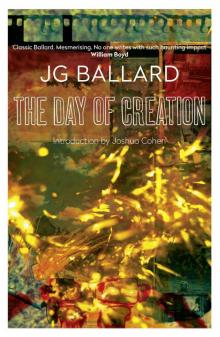 The Day of Creation (Harper Perennial Modern Classics)
The Day of Creation (Harper Perennial Modern Classics) The Crystal World
The Crystal World